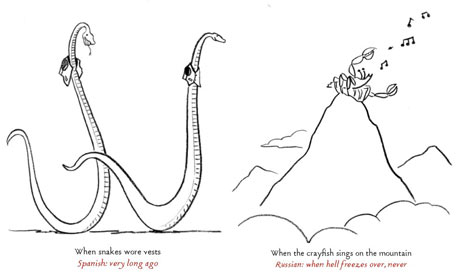
Why do we say "I'm not pulling your leg"? Or "he kicked the bucket"? I don't mean etymologically, I mean logically. Why do we use idioms?
I became fascinated by that question when I discovered that Russians say "I'm not hanging noodles on your ears" when they're not pulling your leg. To us that sounds ridiculous. But let's face it, our idioms don't have a leg (pulled or not) to stand on either. They're just as nonsensical. And they're not alone:
To seize the moon by the teeth: attempt the impossible (French).
To reheat cabbage: to rekindle an old flame (Italian).
When the crayfish sings in the mountain: never (Russian).
Cleaner than a frog's armpit: to be poor, broke (Spanish).
To think one is the last suck of the mango: to be conceited (South American Spanish).
Onions should grow in your navel: a mild insult (Yiddish).
Brew tea from dirt under another's fingernails: to learn a bitter lesson (Japanese).
Belch smoke from the seven orifices of the head: to be furious (Chinese).
The definition of an idiom is a phrase whose meaning isn't clear from the words in it. What a bizarrely illogical way to communicate. There you are hearing someone say "he kicked the" which up to that point could be an ordinary literal expression. Then the word "bucket" comes along and bang, you have to quickly (and non-consciously) substitute the idiomatic meaning. Idioms are curious turns of phrase that require a sudden turn of meaning.
As well as being illogical, idioms are idiotic. The words idiom and idiot come from the same root: "idios" which in ancient Greek meant "of one's own" or "private". The original meaning of an idiot was someone not interested in public affairs (considered a key duty in ancient Athens and perhaps a notion we should revive in modern democracies). Similarly, idioms are a form of private expression. They are cryptic language puzzles, solvable only if you already know the answer in advance.
Despite being illogical and idiotic, idioms are emerging as being much more important to language than previously thought. Linguists such as Steven Pinker believe we have as many idioms and stock phrases in our long-term memory as we have words.
Idioms turn out to be a crucial piece of evidence in the heated and ongoing debate about the evolution of language. Surprisingly, heavyweights like Noam Chomsky believe that language isn't directly a result of natural selection. They believe it's an accidental byproduct of other evolved changes, like increase in brain size. Other titans of the field, such as Pinker, believe language is like any other complex faculty and that it was directly selected for. Chomsky's view of language evolution, based on his word-centric, rule-driven generative grammar model of language can't explain some of the observable properties of idiom use. The specifics get quite technical (it is all about compositionality, what is held in memory and how sentences are constructed). However they aren't too important, the main point is that idioms and other stock expressions aren't peripheral language oddities – they are central to how we communicate.
Getting back to the original question: why on earth do we communicate like this? And people everywhere on earth do – all cultures use forms of non-literal language. The bottom line is that the use of idioms in language is an excellent example of how we aren't built to function only logically. The scientific evidence now suggests that the way we think, about the way we think, is built on an outdated model. That reminds me of a wonderful quote from a professional cartoonist who also teaches a university level course on comedy, who said he thought of "humour as a necessary counterweight to the hegemony of reason". Much other scientific weight is being added to counter the "hegemony of reason" that we've lived under since the Enlightenment.
But enough of that – lets get back to the joys of idioms. What are some of your favourite expressions or idioms, in English or other languages?

